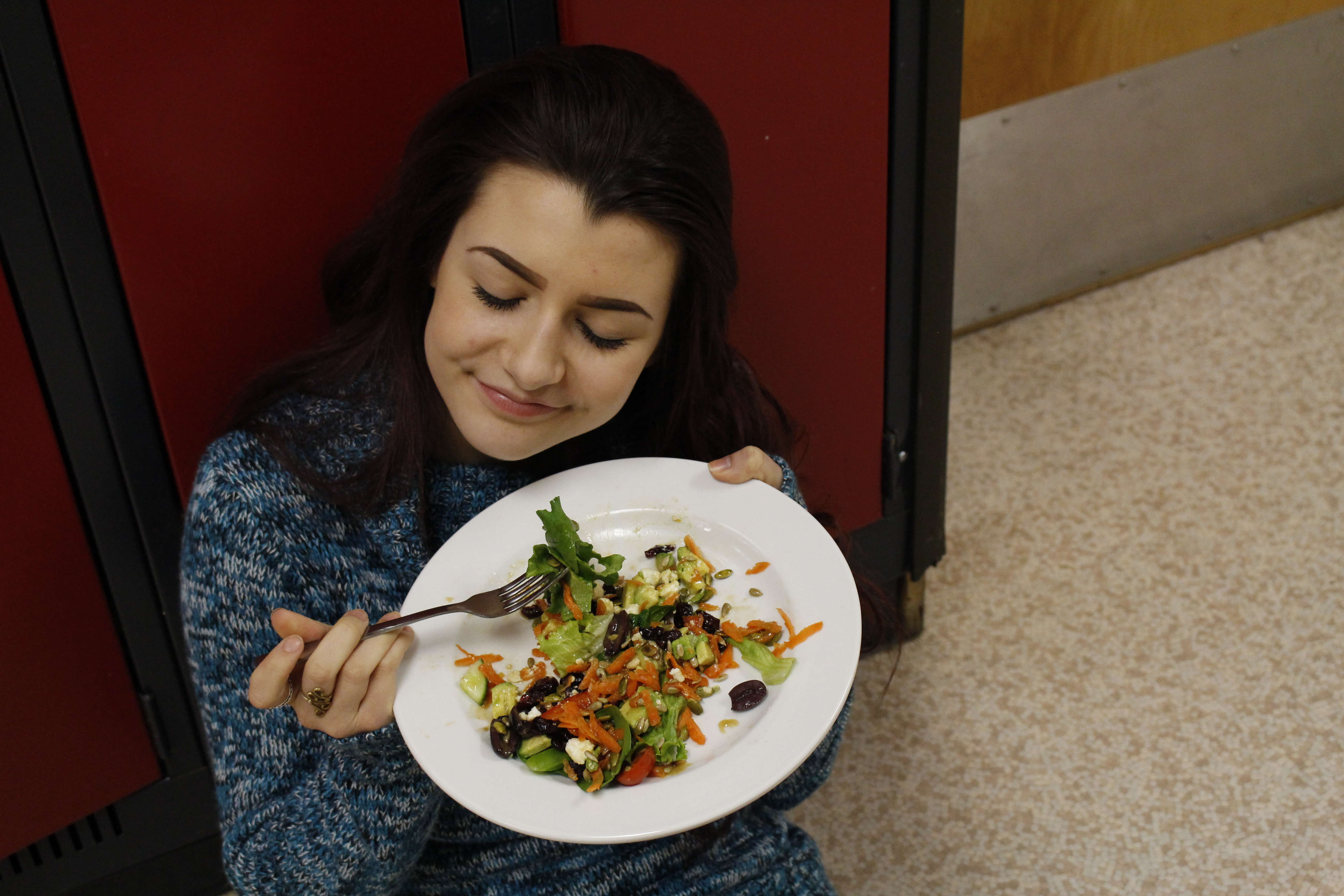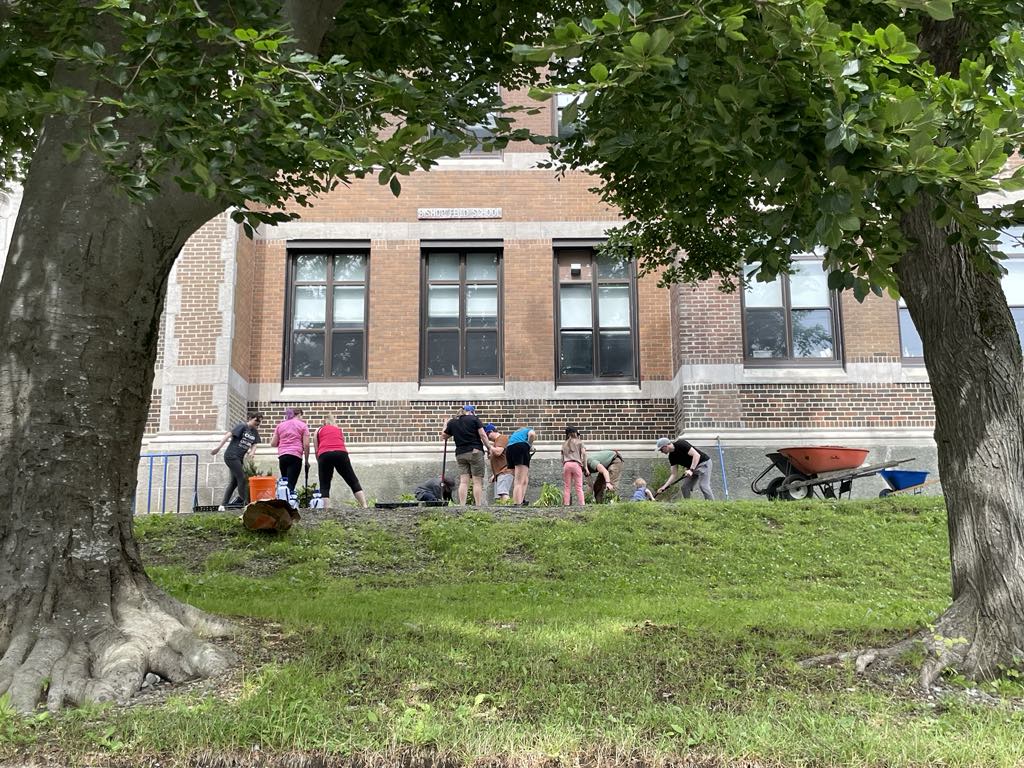Lucerne Elementary-Secondary School, New Denver, BC
2017-2018 (Year 2)
The North Slocan Food Program is based in the small mountain village of New Denver in the West Kootenays. Facilitated by the Healthy Community Society, it centres on activities at Lucerne Elementary Secondary School in SD #10 Arrow Lakes. The Farm to School program has given a huge boost to our school lunch program. Having just finished our 3rd year, our number of accesses is now in the thousands. The HCS has committed to fundraising, supporting local farmers and building strong partnerships within the community to ensure the success of the program. Subsidies are available to any family who requests support. Several hundred pounds of bulk food was purchased from local farmers to ensure local organic produce went into our salad bar, soups and entrees. Students harvested from our garden and greenhouse and preserved tomatoes and other vegetables for use throughout the year. Thanks to the work of four local parents and our Foods teacher, as well as a good number of volunteers, we have been recognized for our innovative work in our school district through a film made about our project called “Greenhouses and Gardens for Sustainability”. This summer we will host a Pop-up Salad Bar at our local farmer’s market with youth as a way of showcasing our school lunch program.
Our program stands out because of its full cycle nature and the amazing connections the students are making to their garden, greenhouse and community. We start harvesting salad greens from our greenhouse in March that were planted from seed the previous fall. As we had a fair amount of edible weeds sneaking into our beds such a s chickweed and lamb’s quarters, we did a lesson on the nutritional properties of these “super weeds” and the students decided we should transplant these weeds into their own large pots so as not to lose them whilst weeding the lettuces!
Indoors this year a High School Foods class started tomatoes, peppers, and flowers seeds for butterflies and bees. Planting the milkweed flats were extremely popular with a group of girls, one of whom had white nail polish and was apprehensive about getting her hands dirty. Within a few minutes she joined the others who preferred not to wear gloves and exclaimed, “Look, I have black polka dot nails now!”
Our Grade 4-6 class were responsible for growing microgreens (peas, sunflowers, radishes) weekly from November to May. Everyone was incredulous at the strength of the microgreen sprouts when we came into the classroom after the weekend and the sprouts had pushed the heavy weights off and sent them tumbling to the floor. We also spent time threshing and winnowing the quinoa and wheat that they grew last season and now appreciate the work that goes into our grains!
Our students are passionate about composting and sifting compost which leads to bug studies! We have purchased a new bear resistant drum style composter called a Joracan 401. The kids love feeding the Joracan, which they have nicknamed JC, and turning the heavy drum is an excellent proprioceptive activity. Keeping daily heat measurements is also exciting as the temperatures get up to over 65 degrees Celsius. Spending a day with a composting expert also exposed students to the wonders of the world of microbes.
The K/1 class has been enjoying weekly forest time with the preschoolers and they especially like taking a small neighbourhood herd of milk goats out to graze with them. Last week they gathered long branches to build a bean/cucumber teepee in the school garden. Each child chose their own branch and then walked them all the way back to school “like dogs on a leash” where they proudly built a large teepee design with a door and then carefully transplanted cucumbers and planted pole beans.
With so many more stories yet to tell, these are a few that highlight the connections and learning for our K-12 student and the impact of our farm to school project.
2016-2017 (Year 1)
 New Denver is in the southeast corner of B.C., nestled in the Selkirk Mountains and on the shores of the beautiful Slocan Lake. Our school, Lucerne, draws from a population of only a thousand people and makes up for its small size with some wonderful programs, a special group of staff, and an engaged student and parent body.
New Denver is in the southeast corner of B.C., nestled in the Selkirk Mountains and on the shores of the beautiful Slocan Lake. Our school, Lucerne, draws from a population of only a thousand people and makes up for its small size with some wonderful programs, a special group of staff, and an engaged student and parent body.
We built our school garden in 2008, in partnership with the preschool, with the help of a playground improvement grant. Staff, student and parents were involved in the design and building of the garden which soon became a lovely centre piece at our school where students eat, play and learn.
Two parents active with the PAC, and also part of a group called the Healthy Community Society, were particularly passionate about the project and so began fundraising to maximize the potential of the garden and then the 30”x 32”greenhouse, which was built a few years later. We established a program running through the spring and fall to help student connect with and learn from the garden. We celebrate the garden and greenhouse as a whole school and community every fall at our Harvest Festival, curricular and after school garden programs. Now, through the winter, we continue with a wonderful farm to table lunch and breakfast program.
Our healthy school lunches and breakfasts have been really well received by students, staff, parents and school visitors, providing weekly four nutritious and affordable meals one of which is cooked by students. Our staff noticed a difference in student behaviour and focus right away when our lunch program began. As our social studies/outdoor education teacher put it,
“The lunch and breakfast program has resulted in several crucial benefits to our school. First, students eating meals together brings a sense of community and equality that benefits student relationships to each other and to the greater school community. Second, students receive much better nutrition, which has increased the ability of students to focus, learn, and self-regulate behaviour, especially in the classes following lunch. Finally, the meal program has increased the sense of belonging students feel toward their school and community, which helps students with self-confidence and the ability to persevere in challenging situations.”
The greenhouse and garden also bring out the most amazing qualities in our students. One of the daily explorations involves lifting logs and looking for bugs to examine and then cover up safely. Our new family from Somalia recently moved here and were, at first, quite alarmed by red wigglers and earthworms, but with the encouragement of the other kids they are now sifting worm compost bins and digging and planting with glee. The preschoolers spend hours rescuing worms from drowning in the tennis court and carrying them to safety in the garden with a special worm saving song.
Green Thumbs, our after school garden club, is attended by a large group of kids of all ages and some parents and is particularly attractive to the most vulnerable children, who don’t necessarily excel at sports but love connecting with nature. One 7 year old regular from a family of nine children comes to the garden and greenhouse and announces, “I am going to be your helper, just because I like to!”
While planting potatoes this spring, she decided potatoes were far too beautiful to eat; she is going to start a potato farm just to save the potatoes, like a potato sanctuary!
The Green Thumbs kids relish in harvesting and preparing creative garden based snacks full of greens, flowers, berries etc. Nasturtium leaf canapes anyone? They love to dig in the garden, draw the garden, share veggies from the garden, and create bug and toad houses, etc. During winter, they miss this garden time so much that they start asking about Green Thumbs in December.
Last year we used our own compost and saved seeds to grow 218lbs of tomatoes which we froze, dried, and sold thru the summer and fall. As well as a good crop of peppers, basil and spring and fall greens. We are committed to creating menus from as much locally produced food as possible, and in so doing we were able to support five local/regional farmers and also create a clear link to our school garden and greenhouse as students proudly serve the produce they have seeded, nurtured and harvested.
Composting is always a big part of our daily program as all the school waste, the garden clippings, and some manure are layered to decompose into fresh soil for the next year. We are one of the only programs in B.C. that is really creating this full cycle of organic waste for students to learn from. This year our compost was so full of red wigglers that we were able to create a worm composter with the kindergarteners for their class which they feed daily. Our school won a B.C. wide competition for innovation in environmental practice two years ago. Last year’s average daily waste at Lucerne was 3kg garbage, 5.4kg recycling and 6.7kg compost.
One challenge we experience in our area is living with bears. So as not to attract bears to our school yard, we compost all our food waste in large barrels using a fermented wheat bran product called bokashi. It decomposes anaerobically in the barrels until it can safely be mixed into our outdoor compost piles. Even then, when grizzlies were in the area last fall, we electrified the compost piles and then protected the students with another layer of snow fencing!
See also Fresh Ideas in Farm to School, from Lucerne Elementary-Secondary School, October 1, 2018




